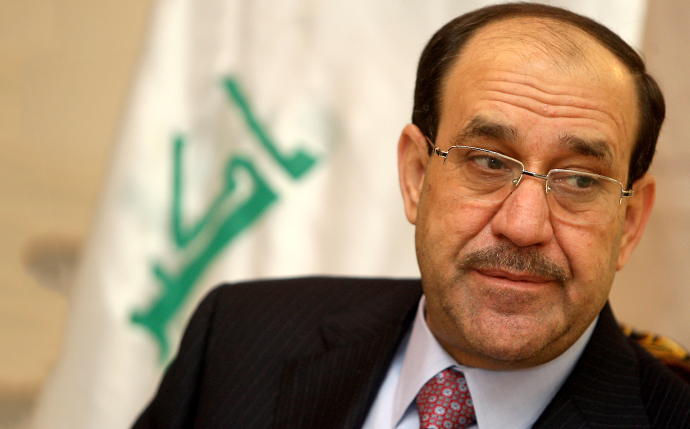'ISIS a pretext for US-sponsored regime change in Iraq'

The ousting of Iraqi Prime Minister Nouri al-Maliki is part of a broader US plan for Iraq and the Middle East as a whole.
Against the backdrop of the war against the Islamic State (IS, formerly ISIS/ISIL), Washington has managed to kill two birds with one stone, as the saying goes. Not only has the US removed a political leader who had proven to be problematic due to his opposition to US military presence in Iraq, as well as his staunch support for Syria and President Assad, they have also created the conditions for the dismemberment of the Iraqi state.
The US and its allies are supporting de facto ‘independence’ for the Kurdish region in the north of the country, using the IS as a convenient pretext for openly arming and supporting Kurdish forces. Naturally, one should not look for altruism in Washington’s motives. Rather, this strategy is to benefit western oil companies with dollar signs in their eyes, licking their lips in anticipation of being able to deal directly with Kurdish President Barzani.
Additionally, Maliki’s ouster deprives Syrian President Assad of a key ally, thereby emboldening the IS and the other militants waging war against Syria. It provides further evidence, as if more were needed, that the political future is bleak for any Iraqi leader who dares to break from the script written for him by Washington. Perhaps most importantly, it allows the US and its allies to be the leading force politically in the war against the IS, an organization created by US policy and covert operations in the region.
In the sales and marketing industry, there is a term known as ‘solution selling’ whereby the salesperson either creates or exaggerates a problem, then presents his or her product as the invaluable solution. Indeed, this sort of sales strategy is precisely the approach Washington has taken in the region, and specifically in Iraq.
The IS disease
The IS has only very recently become an internationally recognized epidemic of militant Islamist extremism that must be eradicated at all costs. That international recognition came only when the organization began taking control of territory in Iraq, threatening Western oil and gas interests. While the IS was waging its brutal and vicious war against the Syrian people and government however, the IS was merely an afterthought, simply a group of extremists fighting the ‘brutal dictator’ Assad.
It seems then that the danger of ISIS and the necessity to eradicate it is directly correlative to US interests. Put another way, the IS is a useful tool in Syria and southern Lebanon where it creates chaos to the detriment of Assad and Hezbollah respectively, while in Iraq, the IS is dangerous where it threatens the US client regime in Kurdistan and Western oil interests. But of course, the detail consistently left out of most analysis of the IS problem is the simple fact that it is a creation of US intelligence and its covert war on Syria.

As early as 2011, the US CIA was involved in an elaborate and widespread program to covertly arm militant extremists in Syria in order to overthrow the government of President Assad. As the New York Times and other media outlets reported in 2012, the CIA was working with the Muslim Brotherhood and other groups along the Turkish-Syrian border to funnel weapons, communications equipment, and other military materiel to terrorist groups at war with Damascus. Despite vehement claims by Washington that only ‘moderate rebels’ were receiving such support, it is an open secret that much of those supplies ended up in the hands of then-ISIS, which already by 2012 was beginning to establish itself as a dominant fighting force in the Syrian war.
Perhaps it should then begin to make sense why, when ISIS launched its allegedly ‘surprise’ attack on the critical Iraqi city of Mosul in June, they were so well armed and equipped with everything from matching pickup trucks to anti-tank weapons, RPGs, and a host of other US-made equipment. Naturally, in the days and weeks following the attack, ISIS armed itself even further with confiscated Iraqi military equipment, also provided by the US. So it would be fair to say that, consciously or unconsciously, the United States helped to create and unleash the IS we know today.
No longer simply another militant organization among many, the IS has grown, thanks to US sponsorship, into the premier terrorist fighting force in the region, capable of engaging national militaries (Iraq, Syria) and other well-organized armed groups such as Hezbollah. In effect, the IS has become the enforcer of US foreign policy, a proxy force that furthers the US agenda without any significant US military presence needed. And yet, the IS is presented in the mainstream media as the greatest threat in the Middle East. Why so? Why were they no threat at all in Syria, but have become the great menace in Iraq?
Iraq, Maliki & Western interests
The US waged an aggressive war and occupation of Iraq for nearly a decade for the purposes of establishing a puppet government that would be amenable to Western economic and geopolitical interests. In many ways, that project failed as PM Maliki emerged as a strong, nationalistic leader who was unwilling to accede to the demands of the occupiers.
Washington wanted to permanently base US troops in the country, and Maliki rejected this proposal, demanding the permanent withdrawal of all US forces by the end of 2011. Maliki purged Iraq of the US-sponsored terrorist organization the Mujahideen-e-Khalq (MEK) which had waged a decades-long campaign of terrorism against Iran by closing down Camp Ashraf, the base from which the organization operated. Maliki also sacked two key figures in Iraq’s banking establishment, both of whom were close associates of neocon darling, and failed Iraqi presidential candidate, Ahmed Chalabi, thereby earning him the ire of Washington, which sought to maintain its grip on the purse-strings of Iraqi wealth.
But of course, these were by no means Maliki’s only ‘crimes’ in the eyes of the US. He also challenged Western oil companies looking to make massive profits off of Iraq’s vast energy deposits. Perhaps the best-known instance occurred in 2012 when ExxonMobil signed an oil exploration deal with the semi-autonomous Kurdistan region in northern Iraq. Maliki rejected the validity of the deal, noting that any oil contracts must be negotiated with the central government in Baghdad, rather than Barzani’s US-aligned government in Arbil. Maliki’s spokesman noted at the time that:
“Maliki views these deals as representing a very dangerous initiative that may lead to the outbreak of wars… [and] breaking up the unity of Iraq…Maliki is prepared to go to the highest levels for the sake of preserving the national wealth and the necessary transparency in investing the wealth of the Iraqis, especially oil… [He] sent a message to American President Barak [sic] Obama last week urging him to intervene to prevent ExxonMobil from going in this direction.”
It is no secret that Maliki’s strong-willed resistance to this deal, in addition to his refusal to pay ExxonMobil upwards of $50 million to improve production at one major southern oilfield led directly to the oil company pulling out of the lucrative West Qurna-1 project. Essentially then, Maliki took on the very powerful oil corporations (BP is no friend of Maliki either), seeking to get a better deal for Iraq. It would be safe to assume that the endemic corruption in Iraq would have made it easier for Maliki and his associates to enrich themselves by skimming off the top and/or receiving payouts from other oil interests. However, this is secondary to the primary ‘crime’ of challenging the hegemony of oil companies in Iraq.

And it is here that we see quite clearly why the US has been so keen on protecting their Kurdish puppet government, which really should be understood as a ruling clique centered on President Barzani and ex-President of Iraq Talabani, their families, and cronies. Since as early as 2011, Western oil companies sought to bypass Maliki and the legal government in Baghdad by making independent deals with the Kurds. Not only did they not want to pay the taxes that would be used to fund the recovery of Iraq from more than a decade of war, they attempted to play the Iraqi and Kurdish authorities off one another in a cynical ploy to more effectively and efficiently exploit the corruption and competition that exists in both.
Of course, it should be noted that the US, Israel, and other Western powers have long maintained very close ties with Barzani and the Kurds. A valid argument could be made that Kurdistan represents a forward base for US military power projection in Iraq and, particularly against Iran. Additionally, Israel has long maintained close ties with Kurdish authorities, both in terms of political support as well as covert intelligence and espionage-related activities. As Israeli scholar Ofra Bengio recently wrote in the pro-US, pro-Israeli publication the Middle East Quarterly:
"From the 1990s on, the American Israel Public Affairs Committee (AIPAC) maintained relations with Kurdish officials since ‘pro-Israel Jewish activists viewed support for the Kurds, a small nation struggling for self-determination in a hostile Arab neighborhood, as helping Israel reach out to a natural ally.’ According to Morris Amitay, AIPAC's executive director from 1974 to 1980, ‘Our Israeli friends always appreciated our friendship with the Kurds.’ Amitay's son, Mike Amitay, also served as executive director of the Washington Kurdish Institute (WKI) from 1996 to 2005.”
Naturally, the Israeli connection is not strictly a benevolent one. Rather, Israeli intelligence and special forces have been deeply intertwined with their Kurdish counterparts as far back as 2003 and the commencement of the second US war in Iraq (though likely decades before that). As Pulitzer Prize-winning journalist Seymour Hersh noted in 2004:
"The Israelis have had long standing ties to the Talibani and Barzani clans [in] Kurdistan and there are many Kurdish Jews that emigrated to Israel and there are still a lot of connection. But at some time before the end of the year, and I’m not clear exactly when, certainly I would say a good six, eight months ago, Israel began to work with some trained Kurdish commandoes, ostensibly the idea was the Israelis — some of the Israeli elite commander units, counter-terror or terror units, depending on your point of view, began training — getting the Kurds up to speed."
So, as should be self-evident, Washington’s decision to use military force against ISIS is a cynical ploy to protect intelligence assets, economic interests, and create a nominally independent Kurdish state which will become integrated into the US-Israeli sphere of influence in the region. In order to achieve these strategic objectives, first and foremost, Maliki had to be gotten rid of.
And so, regime change has once again come to Iraq, this time through the backdoor. By arming ISIS in Syria, the US unleashed a monster in Iraq, which it now uses as the pretext for fulfilling the long-standing goal of de facto partition of Iraq. With Kurdish independence robbing Iraq of vital oil resources, it is unlikely that any ruling coalition consisting of Sunnis and Shia will effectively govern the country, regardless of the individuals at its helm. And this is precisely the point. Sadly, in the interests of the West, Iraq will now endure yet another civil war and period of misery and despair. There will be no economic development, no political progress, no peace. Exactly what Washington wanted.
The statements, views and opinions expressed in this column are solely those of the author and do not necessarily represent those of RT.
The statements, views and opinions expressed in this column are solely those of the author and do not necessarily represent those of RT.













